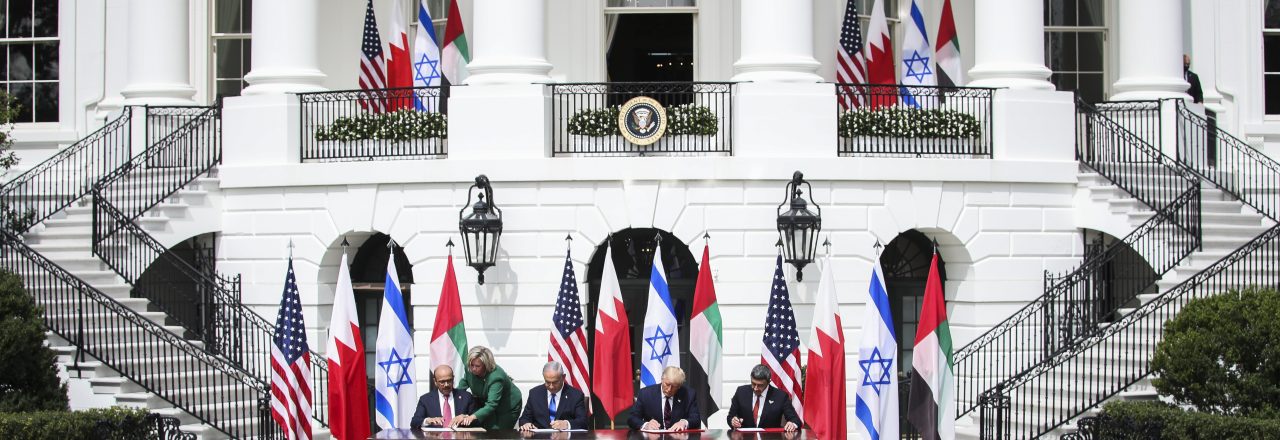
Abstract
The Abraham Accords reflect a paradigmatic change in the geo-political and strategic order in the Middle East and could be leveraged to create a breakthrough in the Israeli-Palestinian political stalemate by establishing a broader regional envelope. Broadening and enlarging the regional framework is actually changing the existing paradigm, which is bilateral by its essence.
Establishing and operating a regional system based on meaningful cooperation between the players creates mutual dependence that contributes to better understanding and strategic cooperation that leads to more security and stability. Due to the continuing political stalemate in the Israeli-Palestinian political process, the establishment of the regional system that includes the Palestinians enables Israel and the Palestinians to make some mutual essential concessions that they have failed to make in the bilateral track.
The role of the European Union (EU) should be explored in terms of its contribution to the creation and facilitation of the system, which could potentially contribute to the resumption and advancement of the political process between Israel and the Palestinians.
Introduction
The Negev Summit held in March 2022 is one of the most significant highlights of the new era in the Middle East and symbolises the normalcy of the normalisation process where Israel became not only a legitimate neighbour and partner but a trusted and valued ally and player. The participation of senior leaders and officials from leading Arab countries legitimised the potential of diverse immediate and future cooperation between countries, peoples and the business sector that could change the regional landscape. The summit is a direct outcome of the Abraham Accords, which reflect a paradigmatic change in the geo-political and strategic order in the Middle East and could be leveraged to create a breakthrough in the Israeli-Palestinian political stalemate by establishing a broader regional envelope that includes the Palestinians together with Israel, Jordan, Egypt and the Gulf countries along with the EU and especially the southern flank countries that share a common strategic interest in the Mediterranean Eastern Basin (Greece, Cyprus, France, Italy, Spain and Malta).
Broadening and enlarging the regional framework is actually changing the existing paradigm, which is bilateral by its essence. Environmental and climate challenges are regional and cannot be tackled but by regional cooperation. In addition, establishing a regional system enables partners to unite efforts and experience, as well as resources, in order to cope with infrastructural challenges relating to transportation, water desalination and supply, agriculture and food security, energy and more.
Advancing the Israeli-Palestinian political process through regional cooperation
Establishing and operating a regional system based on meaningful cooperation between the players creates mutual dependence that contributes to better understanding and strategic cooperation that leads to more security and stability. Due to the continuing political stalemate in the Israeli-Palestinian political process, the establishment of the regional system that includes the Palestinians enables Israel and the Palestinians to make some mutual essential concessions that they have failed to make in the bilateral track. Being a part of a broad and solid alliance that shares common interests and provides a series of economic, security, technological and infrastructural benefits that do not exist in the narrower bilateral framework could reduce obstacles in their bilateral dialogue.
The idea is to adopt some basic modes of organisation and operation of the EU and to adjust them to establish the Eastern Mediterranean Basin regional system and then prioritise the benefits that will be found as overlapping for all the players, suggesting a comprehensive and coherent strategy for advancing them where the resumption of the Israeli-Palestinian political process will be an outcome as well as a component of this strategy.
Adopting such a strategic paradigm requires assessing the political and economic/financial feasibility for establishing a broader regional system of the Eastern Mediterranean Basin that includes Israel, the moderate Arab countries and the Palestinians together with relevant EU institutions and interested member states, as well as defining the system’s characteristics and its potential contribution to regional security and stabilisation, and to the region’s economy and prosperity. The role of the EU should be explored in terms of its contribution to the creation and facilitation of the system, which could potentially contribute to the resumption and advancement of the political process between Israel and the Palestinians.
Why is the EU model applicable to the East Mediterranean framework?
The economic recovery of Europe from two consecutive world wars was predicated on the understanding that it had to be based on de-linking the pace of the political recovery from the economic one and that acting within a purposeful union is necessary. The European economic organs that had been created in the wake of the Second World War far preceded the political ones and they had been proven essential in both the recovery and meeting the constraints of the Cold War.
This background is truly relevant to the Middle East generally and the Eastern Mediterranean in particular. These two regions are beset by long-standing ethnic, religious and political conflicts exacerbated by wars, the ongoing civil uprising (the “Arab Spring“) and more recently COVID-19 and the war in Ukraine. The superpowers’ race for domination of strategic routes and positions and control of natural resources that could be accelerated due to the Ukrainian-Russian war further divided the whole Southern Mediterranean Basin and is reflected in today’s lack of regional cohesion and ability to act in unison.
One rare exception was the 1991 Madrid Conference, which established five regional working groups on environment, arms control, water, refugees, and economic cooperation. The EU was the gavel-holder of the latter, which functioned very well due mostly to the cooperation and coordination between the four core players: Egypt, Jordan, the Palestinians and Israel.
Further attempts led by the EU such as the Barcelona Process, the Union for the Mediterranean (UfM) and the European Neighbourhood Policy (ENP) have been made but they have failed to revive the success of the post-Madrid Conference period between 1991 and 1996. That may be the result of overcrowding the agenda proposed by these initiatives with ambitious political goals, on the one hand, and the lack of a political horizon for the non-European participants, on the other.
The lessons learnt from both the European experience and the Regional Economic Development Working Group are very important and they should be applied and adjusted to current Eastern Mediterranean Basin conditions, realities and needs. There are already building blocks that could be used to expand the regions’ cooperation and joint activities. Egypt, Jordan, Israel and the Palestinians have been participating in the East Mediterranean Gas Forum (EMGF), and they are joined by three EU members: Italy, Greece and Cyprus. The idea of using the EMGF is worth probing and especially questions relating, for example, to the Palestinian’s willingness to broaden this forum into a regional platform for wider economic cooperation on energy, water, green economy and tourism. Another pertinent question is Turkey’s involvement and under what conditions. Current Turkish efforts to improve its relations with Israel, the United Arab Emirates (UAE) and Egypt could facilitate certain activities, and serious consideration should be given to a potential Turkish contribution. On the other hand, the Iranian influence on Hezbollah and through it on Lebanon could be found as a challenge and obstacle to realising the strategy.
A system of interdependencies for greater stability in the region
The regional system will be based on the rationale of economic cooperation aimed at providing a relevant response to common needs and develop holistic, systemic and regional responses for environmental and climate challenges. The purpose is to improve the capacity for responding and tackling climate and environmental challenges and building the capacity for solving the water, energy, agriculture and food security problems that the entire region is facing.
The working assumption is that a significant improvement of the response capacity for tackling climate and environmental challenges and developing the capacity for coping with other existential needs and problems can be attained through an increased level of regional cooperation, and that some of it is already taking place. If expanded, it will lead to an improvement of living standards and quality of life for the citizens of the participating countries, as well as to decreasing the potential damage of climate and environmental challenges that intensified in the last decade.
Such a regional system could not be successfully operated without essential deep and preliminary cooperation of analysing, planning and implementation shared by all participants. The process and especially the implementation will create a system of interdependencies, which will in turn increase the region’s stability.
An enhanced mode of regional cooperation, which is supported by the Quartet and especially the EU and the United States (US), could also reduce the impact of aggressive/assertive policies and actions conducted by Iran and Turkey if it renews its hostility towards the leading partners.
Several states in the region, including some of the oil and gas producing ones, have already started to plan for the post fossil-based energy era. The process should be encouraged by the international community and especially the EU, whose flagship is the “Green Deal”. The cooperation, for example, between states with desalination capacity and states capable of solar energy production can accelerate the process of moving towards the “green economy”.
The suggested regional system should develop operational flexibility that enables operation of sub-regional systems, feeding cooperation in those sub-systems where they in their turn will empower the regional system. Thus, for example, Jordan, the Palestinians and Israel can start almost immediately implementing the water-energy nexus leaving the door open for neighbouring countries to join at a later stage.
The regional system will provide a strategic response for the sub-regional water crisis and enable trade-off of water and energy where countries like Israel situated along the Mediterranean shore will develop a robust desalination infrastructure for supplying water to Jordan and the Palestinian Authority (PA), while countries like Jordan, with the required and suitable conditions, will produce green, solar and/or wind energy that will be transferred to other countries by using a regional electricity infrastructure.
Participation and engagement of interested European institutions and countries and EU leadership will enable essential political and financial guarantees to be provided for international companies for investing the required capital required for developing regional infrastructures.
The regional system could facilitate the establishment of research centres for developing green energy resources. Combining resources will enable maximising the research effort, as well as the development of capacities and standardization of processes. It will facilitate a common language between the partnering countries. The Middle East Desalination Research Center (MEDRC) is the best example of what can be achieved through regional cooperation. It was established by the Madrid Conference’s water working group in Oman, financed by several donor states and continues to function to this very day.
Conclusions – Looking forward and shaping the regional future
Realising the potential of the normalisation era and translating the spirit of the Abraham Accords into significant changes of the regional landscape and leading it and its peoples towards a new and more promising horizon demand leadership, strategy, determination and cooperation. The EU heritage and experience could be an important asset and advantage in this regard. The EU can and should contribute knowledge, as well as leadership and inspiration in addition to a full partnership. The future regional system should also include European countries in order to enlarge the system in a way that will create more opportunities and prospects and will facilitate trust building that, in its turn, will enable a broader space of flexibility due to interdependence between the players and more guarantees that will be provided by the partners of the potential regional system that one day might become a kind of regional alliance.
Such a process compels early preparations in order to identify possible obstacles and barriers and formulate relevant responses to tackle them in advance.
At this point, some major obstacles and barriers that need early preparations and resource allocation should be addressed, namely: the absence of tradition and experience in regional cooperation; resistance of broad Arab publics to bilateral and regional cooperation that is perceived as an act normalisation with Israel; shortage of funding resources; inadequate guarantees for international private firms; security instability and low level of state functioning in several Arab countries which are relevant to the regional system; and Palestinian refusal to join the Abraham Accords framework and most of the other regional frameworks fearing that normalisation with Israel will marginalise their national political aspirations in the Arab discourse and agenda.
Tackling these barriers requires a broad consensus and cooperation between the leading partners in addition to EU and US political guarantees to the partners and mainly to the PA, which faces severe difficulties and hesitation regarding such a initiative. The main incentive for the PA should be the promise and certainty that this initiative will not come instead of the political process that will lead to Palestinian independence in the form of a two-nation-state paradigm. Assuming that such a regional partnership will create mutual dependence between the partners and will increase and strengthen mutual interests enables Israel to be more flexible with regard to its security demands, where at least part will be addressed by the regional partnership and the broadening process of normalisation. The PA, in its turn, will have to be more flexible with regard to its sovereignty demands, to improve its institutional and state functionality and to demonstrate a serious commitment to addressing terrorism and incitement. It is true that economy cannot replace national identity and demands but it surely can facilitate their realisation in a broader, more flexible and negotiated manner.




